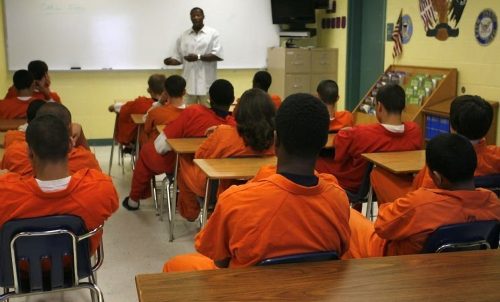
Via Wikimedia Commons

This work is licensed under a Creative Commons Attribution-ShareAlike 4.0 International License.
By Ghostwrite Mike and The Mundo Press
CHOWCHILLA, CA – At Valley State Prison (VSP), Associate’s and Bachelor’s college degree programs offered though Coastline College, Merced College, Feather River College and CSU-Fresno are only available for documented students.
Nearly 40 percent of California’s imprisoned adults are considered functionally illiterate, by virtue of lacking either a GED or high school diploma.
Savage, a Mexican-native youth offender serving an indeterminate 30-to-life term, was arrested at the age of 16 when he didn’t know English, and spent 10 years in the California Department of Corrections and Rehabilitation’s (CDCR) Adult Basic Education (ABE) high school program before graduating. We interviewed him in order to discover why.
When one walks into any of the ABE high school classrooms at Valley State Prison, more than half the students are non-English speakers over the age of 40.
In order to graduate these long-term ABE students and to open seats for a growing backlog of English-speaking students who are unable to get into ABE classes at all, a robust English Second Language (ESL) program is necessary.
However, at VSP, as is the case at most of 30+ correctional facilities throughout the state, there is only one ESL class, and those students must become proficient in English before their seats become available.
For a decade, Savage’s repeated requests for ESL assistance have been denied. As a result, he has compensated by conversing in English using colloquialisms that shaded the real comprehension problem. He has never developed a reading proficiency in English.
“I couldn’t pronounce in English what I saw on the page, and I couldn’t write what I wanted to say in English, even though I could parrot basic things vocally. Nobody helped me. For 10 years, at different prisons even, I could never get into an ESL class, because they always only have one class. They throttle us on purpose,” he said.
Investigating this reality, demographically 18 men over the age of 50 who have been assigned to the ESL class for over a decade make up the students who populate the single class.
When we asked the ESL teacher Ms. Elizondo why only one ESL class exists despite an obvious need for more, she laughed and said, “The same reason non-citizen resident students can’t attend college here—they will all be deported upon parole or release, so, the state figures, why bother?”
It is true that students like Savage, who lack a Social Security number, are unable to attend college classes during imprisonment like other residents who utilize tax-funded higher education degree programs that are free to VSP residents.
“Say that back to yourself out loud,” retorts Savage. “I’m in prison to get rehabilitated (and) it takes me 10 years to complete my high school education without the ESL help I was entitled to. Now I’m refused college access because I was brought here illegally by my parents while everyone else here moves onto college. How is that equality under the law?”
Were VSP to monitor the progression of the students enrolled in its single ESL class and expand ESL access to include students like Savage by opening multiple ESL classrooms—which, in turn, would open up ABE classrooms to more English-speaking students sitting on the sidelines, the problem would be solved.
As a result, a lot more Spanish-speaking ESL high school graduates and GED earners would get paroled and deported. However, it seems the advancement of the English-speaking residents is not important enough to the prison to devote ESL resources where needed. CDCR, seemingly, has accepted squatters as a de-facto reality and abandoned the English speakers who are kept out.
Ironically, were Savage living a few hundred yards in any direction within California, instead of at VSP, he’d be free to attend any community college, CSU, or UC campus, despite his immigration status. In fact, his exceptional history of adversity would likely earn him scholarships that would fund the education CDCR now prevents him from accessing.
“CDCR made its funding money off of me for 10 years while I was compelled by federal law to receive a high school education and sit in that ABE class, while they simultaneously violated another federal law that requires that students like me receive the ESL services I was never afforded,” Savage said.
“They used the squatters in the ESL class to justify keeping me out of ESL. Guys like me in the ABE class became the fake excuse for why English speakers couldn’t get into ABE at all—in order to maintain the status quo that prevents undocumented resident students from attending college in prison,” he added.
Savage has now become an English-speaking public speaker, mentor and poet. In addition, he has appeared in CDCR’s promotional videos that amplify the State’s Youth Offender Program and NBC’s broadcast coverage of VSP’s many academic programs.
Savage told us he wants “to write, speak and advocate for causes that need to be amplified. I feel like there has to be a purpose for the path I’ve had to travel that helps others, since I’ve been denied what others have been afforded.
“I think journalism might be that thing that lets me funnel my frustration and make an impact where one is needed. If I can’t get myself into college, perhaps I can get myself published while being of service to my peers. If language was what they used to deny me access, I hope to use language to report about injustice.”
toto togel
toto slot
situs toto
prediksi hk
jacktoto
jacktoto
situs togel
slot mahjong
rtp slot

